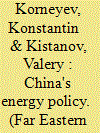| Srl | Item |
| 1 |
ID:
175941


|
|
|
|
|
| Summary/Abstract |
The principles of shaping and implementing China's energy policy have undergone significant changes since the early 2000s, due to China's increasing geopolitical role in the world and its becoming the largest importer of primary energy resources, crude oil and natural gas. The adaptation of Japan's experience has played a significant role in this process - the stages of development that Japan's energy policy had previously undergone are undoubtedly repeated now in China. The similarity of the economies, their export-oriented nature, and the lack of their own fossil fuels have manifested themselves. The analysis and assessment of the peculiarities of China's energy policy development, complemented by Japanese experience, will make it possible to explore the topic of this article more fully, without focusing solely on domesticl Chinese problems.
|
|
|
|
|
|
|
|
|
|
|
|
|
|
|
|
| 2 |
ID:
128406


|
|
|
|
|
| Publication |
2014.
|
| Summary/Abstract |
This study aims to examine how China's energy security has changed over 30 years of reform and the opening period. It constructs a 4-As quantitative evaluation framework-the availability of energy resources, the applicability of technology, the acceptability by society, and the affordability of energy resources. The quantitative results show that China's energy security was at its best during the sixth FYP period (1981-1985), but then deteriorated until it hit higher levels between 1995 and 2005. However, it was still lower than the level reached during the sixth FYP period. During the eleventh FYP period (2006-2010), the energy security situation deteriorated again. Differences in policy priority over the study period appear to affect the country's energy security status. This study suggests that China needs to develop renewable energy resources on a large scale and pay more attention to emissions control to reverse the downward trend in energy security.
|
|
|
|
|
|
|
|
|
|
|
|
|
|
|
|